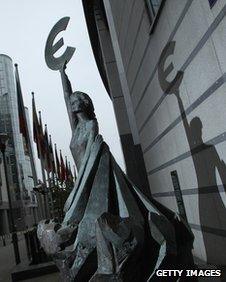Eurozone's score card
- Published
- comments

The euro's 10th birthday fell on 1 January but celebrations were distinctly muted
As Europe's leaders gather yet again in Brussels, it is worth assessing where we are with the eurozone crisis. It has been blowing for two years. It has not abated. In that time there have been, at least, 15 summits. Maybe more. A long grinding, gruelling marathon to hang on to a European dream.
The crisis started with Greece in October 2009 and the discovery of its faked accounts. A deficit of 6.7% turned out to be in reality closer to 12.7%. In May 2010, in order to stave off a Greek bankruptcy, the eurozone agreed to a bailout of 110bn euros (拢92bn; $145bn). It bought time but little more.
By October 2011, it was recognised that Greece would need a second bailout - this time for 130bn billion euros.
That is still being negotiated. It comes in two parts.
Part one: private investors have been asked to take voluntary losses of up to 70%. That should wipe 100bn euros off the Greek debt mountain. There could be agreement on this in the next few days.
Part two relates to the need to implement a further 2bn euros of spending cuts this year. Those talks are controversial and complicated.
Greeks are not just weary of cuts; they believe the austerity medicine has plunged the country into an economic downward spiral. Its unemployment stands at 18%. For the fifth year, its economy is shrinking. Its debt mountain has risen to 160% of GDP.
The suggestion by the Germans that control of the Greek economy should be handed to an EU commissioner has led to barely disguised fury in Athens. One minister described it as the '"product of a sick imagination."
If a deal is not completed by the third week of March, Greece will once again face bankruptcy.
During the past two years, a monetary union has take a giant stride towards becoming a fiscal union. There will be much closer scrutiny over tax, spending and budgets with sanctions to be used against those who break the rules.
The finishing touches to the intergovernmental treaty establishing this should be agreed at this summit. Its impact, however, will be on the long term.
It was this treaty that prompted UK Prime Minister David Cameron to use his veto in December. His party will be watching closely to see whether he agrees to the eurozone countries being able to use EU institutions to support the new treaty.
One of the unresolved problems hanging over the eurozone was what would happen if relatively big economies like Italy and Spain got into trouble. There was neither a fund big enough to rescue them nor a firewall large enough to prevent contagion.
A permanent rescue fund, the European Stability Mechanism (ESM), has been brought forward and should be in place by the summer. It will have a lending capacity of 500bn euros.
There are still 250bn euros in the existing rescue fund, the European Financial Stability Facility (EFSF). One plan is to run these two funds in parallel.
The Germans are currently under enormous pressure to boost the fund to over a trillion. That won't be settled at this summit but it won't go away either.
Another plan is to get the IMF to boost the "firewall" to 1.5 trillion Euros. (If the eurozone countries contribute more, then the UK will too.)
The European Central Bank is still not acting as a lender of last resort but, by flooding the banks in December with cheap long-term money, the banking crisis has eased. It has also encouraged some banks to buy bonds of countries like Italy and so bring down their borrowing costs.
Until now, austerity has been the German medicine of choice. In 2012, much more attention will being given to growth. Why? Because many countries are heading into recession just as austerity measures start to bite.
The unelected Italian leader Mario Monti fired a warning shot at the Germans when he said they were seen as "the ringleader of EU intolerance". German Chancellor Angela Merkel now says "it is equally important that we speak about growth and job creation". That said, there is no backing away from bringing down deficits.
The warning signs are everywhere. Europe isn't working. There are 25 million people out of work. Nearly six million of those are under 25.
Part of the focus of this summit will be youth unemployment, with a plan that within four months of leaving school, young people will receive an offer of employment or continued education or training.
If Europe is to recover, much deeper questions have to be answered. Are Europe's welfare states sustainable? How will Europe compete with emerging nations? Does Europe and in particular the EU have to rethink its whole attitude towards regulation?
So Europe staggers on. The crisis is less intense than it was. The patient is no longer critical but remains dangerously unstable.